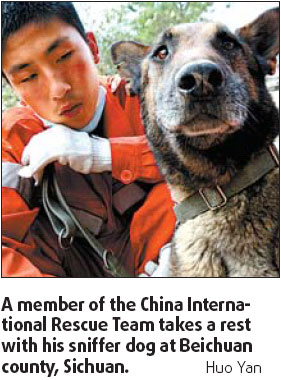Rescuers earn time off
Zhang Qingshan and the China International Rescue Team had not had a proper dinner since their rescue work for the May 12 quake victims began - until last Wednesday.
It was a real meal with rice. By 8 pm, they also managed to get some rest, said Zhang, vice-battalion leader of the 150-member group.

After a week of tireless rescue efforts in the region, the team finally adjusted to a calmer schedule.
When the magnitude-8 earthquake hit Sichuan, the rescue team - established as a joint entity including the Chinese Seismological Bureau, PLA General Hospital and the Armed Police Force - headed to the province.
Zhang, a middle-aged native of Shandong, joined the group in 2006 following more than a dozen years in the army. Combining his years of service, Zhang is one of few in the battalion who are seasoned rescue operaters.
The first few days entailed non-stop work for the team. Each day, they were dispatched to different locations. With life detectors, sniffer dogs and medical supplies, the rescue group trekked through Hanwang, Beichuan, and Dujiangyan - some of the disaster's hardest-hit areas.
Zhang reportedly lost his voice from calling out to possible survivors buried in the ruins. But he was more concerned that the work was too draining for his battalion. If the task at hand was particularly strenuous, he assigned four groups to rotate every six hours - rather than three groups switching off every eight hours.
"After all, human endurance has its limits," he said.
Without running water or electricity for days, the team worked while sustaining themselves with available resources: instant noodles and bottled water. Aside from the punishing physical tasks of clearing rubble and digging out victims, the battalion also endured the emotional impact of witnessing the quake's aftermath.
For the majority of the team, it was the first plunge into real-life disaster. The scale of devastation and raw images of human suffering shocked those who had experienced no worse than timed, controlled exercises.
The sight of young children buried in the rubble was the most jarring.
"None of the team members had ever seen that many corpses," Zhang said.
But, they had to learn and adjust, and did so quickly. Chinese rescuers worked non-stop for days until international assistance came. The Japanese rescue team was the first to arrive on May 16. Russia, South Korea, France and Singapore also sent rescue teams.
With more than 200 foreign workers in the province, Zhang said the groups communicated mostly via translators. Members of his battalion who had aided in disasters abroad - Pakistan's earthquake in 2005 or Indonesia's tsunami in 2004 - also helped bridge the language chasm.
On Monday morning, the team brought out 61-year-old Li Mingcui, who had been buried for more than 160 hours in Beichuan county. Her town, near the epicenter, was heavily damaged. Li sustained multiple fractures and infections.
As the immediate aftermath passes, the rescue team is able to relax a little longer and enjoy cooked. Though the exhausted rescuers are slowly adjusting, it remains a "non-stop, high-danger" job. The quake's immediate destruction has passed, but the threat of infectious disease from decaying humans and animals now loom as operations continue.
(China Daily 05/29/2008 page18)














